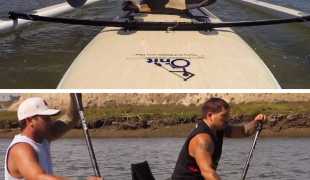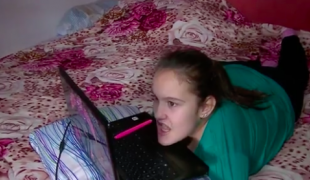- 4923
- 245
- 0
- 1
- 0
- Help Ukraine
About the solution
This recreation device which enables disabled children to better engage with bowling, soccer and other physical activities. The Overcomer is a versatile physical activity system that is able to operate with a multitude of different manual and power wheelchairs, walkers, standers, and gait trainers. The interchangeable sport and gaming attachments make it possible for users to participate in a number of fitness and health-related activities and transition from one to the next quickly and easily.
This device can connect to a wheelchair, braces, walker or gate trainer, and has seven different attachments for various sports. The teacher spent two months in his garage building the device.
Kabes has no experience regarding 3D printed or making inventions, but he’s familiar with the human body and its limitations.
”In physical education, when there's individuals in wheelchairs and things like that, it presents challenges trying to have them be as included as the general population," Kabes said. “Most individuals take for granted the ability to kick a soccer ball or to dribble a basketball.”
In order to generate funds for The Overcomer, the gym teacher has started a GoFundMe campaign. Kabes has set a target of $30,000, to pay for a patent, attorney fees and a 3D print of his prototype. If everything goes smoothly, he plans to use the remaining funds to mass produce the first run of devices.
“The Overcomer was developed to ensure that my students with Cerebral Palsy and ambulatory needs felt successful, engaged, and empowered. I quickly realized that there isn’t a wide range of equipment options for individuals with special needs, especially those in walkers, standers, wheel chairs and gait trainers”, the inventor explained.
More info: https://www.gofundme.com/TheOvercomer
Adapted from: http://bit.ly/2faNaPU
What about you, do you have any solutions? Please share them with the Patient Innovation community!
This solution shall not include mention to the use of drugs, chemicals or biologicals (including food); invasive devices; offensive, commercial or inherently dangerous content. This solution was not medically validated. Proceed with caution! If you have any doubts, please consult with a health professional.
DISCLAIMER: This story was written by someone who is not the author of the solution, therefore please be advised that, although it was written with the utmost respect for the innovation and the innovator, there can be some incorrect statements. If you find any errors please contact the patient Innovation team via info@patient-innovation.com
-
-
156
-
0
-
3326

Paddleboard for wheelchair users
Surfing
Social interaction
Paralysis
Amyotrophic Lateral Sclerosis
Cerebral Palsy
Muscular Dystrophy
Limb Amputation
Bone Disorders (Decalcification, Bone Deformity, Bone Fracture, Bone Infection)
Educational/Leisure device (book, toy, game...)
Difficulty walking or moving
Difficulty coordinating movements
Paralysis of the legs and lower body
Joint deformity
Restoring mobility
Promoting self-management
Promoting inclusivity and social integration
Maintaining Balance and Mobility
Medical Genetics
Neurology
Orthopedics
United States
-
-
-
331
-
0
-
7014

Patient develops sand rider wheelchair
MOVING IN A WHEELCHAIR: Moving using a wheelchair.
CAREGIVING
Walking Aid (wheelchair/walker/crutches)
Restoring mobility
Promoting self-management
Promoting inclusivity and social integration
To implement a diagnostic tool
Maintaining Balance and Mobility
Caregiving Support
General and Family Medicine
Medical Genetics
Neurology
Orthopedics
Rheumatology
Aging
Mobility issues
Solutions for Disabled people
United States
-
-
-
341
-
0
-
5974

Glasses to serve as mouse for disabled people
CAREGIVING
Playing
Video gaming
Studying
Bone Disorders (Decalcification, Bone Deformity, Bone Fracture, Bone Infection)
Assistive Technology access
Body-Worn solutions (Clothing, accessories, shoes, sensors...)
Educational/Leisure device (book, toy, game...)
Difficulty walking or moving
Muscle weakness
Limited range of motion
Muscle pain or stiffness
Reduced grip force (grip)
Loss of muscle coordination
Muscle cramps or spasms
Joint deformity
Joint redness or warmth
Difficulty bearing weight
Muscle twitching
Numbness or tingling in the extremities
Joint pain or swelling
Promoting self-management
Preserving Organ Function
Managing Neurological Disorders
Promoting inclusivity and social integration
Medical Genetics
Neurology
Orthopedics
Rheumatology
Mobility issues
Solutions for Disabled people
Brazil
-
 en
en